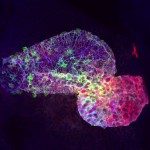Lien vers Pubmed [PMID] – 33132864
Lien DOI – 10.3389/fnbeh.2020.588834
Front Behav Neurosci 2020 ; 14(): 588834
According to a novel hypothesis (Arnal et al., 2015, Current Biology 25:2051-2056), auditory roughness, or temporal envelope modulations between 30 and 150 Hz, are present in both natural and artificial human alarm signals, which boosts the detection of these alarms in various tasks. These results also shed new light on the unpleasantness of dissonant sounds to humans, which builds upon the high level of roughness present in such sounds. However, it is not clear whether this hypothesis also applies to other species, such as rodents. In particular, whether consonant/dissonant chords, and particularly whether auditory roughness, can trigger unpleasant sensations in mice remains unknown. Using an autonomous behavioral system, which allows the monitoring of mouse behavior over a period of weeks, we observed that C57Bl6J mice did not show any preference for consonant chords. In addition, we found that mice showed a preference for rough sounds over sounds having amplitude modulations in their temporal envelope outside the “rough” range. These results suggest that some emotional features carried by the acoustic temporal envelope are likely to be species-specific.

